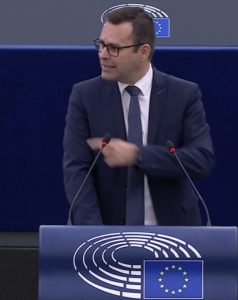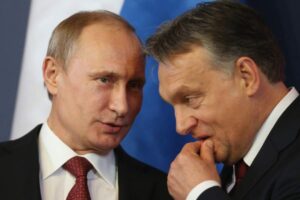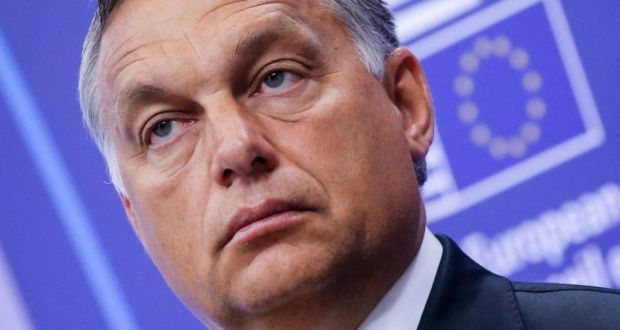It was once said that Hungary had shaken off the iron grip of Soviet communism only to discover, three decades later, a velvet glove concealing a clenched fist.
Under Viktor Orbán, the country’s longest-serving post-communist prime minister, Hungary has not only slid backwards from liberal democracy but, increasingly, it has done so with European Union money fuelling its retreat.
Hungary’s transformation from a hopeful post-1989 democracy into a state beset by kleptocracy has been well documented. What is striking now is the boldness with which corruption operates — and how deeply it has embedded itself in the apparatus of power. From EU funds being siphoned to cronies, to public procurement marred by single-bid contracts, Orbán’s Hungary has become the EU’s most brazen example of state capture.
Perhaps no story encapsulates the strange moral terrain of modern Hungary better than that of Lőrinc Mészáros. A former gas fitter and friend of Orbán from the small village of Felcsút — where Orbán himself was raised — Mészáros has seen an astonishing rise in wealth since Fidesz returned to power in 2010. In less than a decade, he has become one of the richest men in the country, with interests spanning media, construction, tourism, and agriculture. His secret? He wins public contracts — a lot of them.
_________________________________________________________________________________________________________________________

Csaba Molnár, MEP
“The situation in Hungary is serious cause for concern. The US recently banned six Hungarian government officials from its territory because of suspected corruption, and the Sarajevo-based Organised Crime and Corruption Reporting Project (OCCRP) voted Viktor Orbán as the second most corrupt politician. The EU institutions have so far failed to take effective measures to curb corruption in Hungary.
“Most recently Lőrinc Mészáros, a friend of the prime minister, rose from being a simple gas fitter to one of the richest people in Hungary in a few years. The Mayor of Felcsút bought a pig farm at the end of 2014, which was precisely when the Hungarian agricultural authorities asked the Commission for permission to double animal welfare assistance.
“The current Hungarian government is trying to make the businesses of those close to it profitable at the expense of EU taxpayers. In addition, in January the Hungarian authorities published a call for tenders for the construction and renovation of embankments for which the company owned by Lőrinc Mészáros is the only suitable applicant. This means that, with no price competition, the sole applicant who is suitable can do the necessary work for any amount he wishes from the EU’s 2007-2013 budget.” – Csaba Molnár, MEP.
_________________________________________________________________________________________________________________________
A report by the European Commission in 2021 found that Hungary had the highest proportion of EU-funded projects awarded to single bidders. The beneficiaries of these tenders? Overwhelmingly companies with close ties to the ruling party, many of them linked directly or indirectly to Mészáros. In one notorious case, Elios Zrt, a lighting company co-owned by Orbán’s own son-in-law, István Tiborcz, was found by the EU’s anti-fraud office (OLAF) to have won public contracts through manipulated tenders. The Hungarian Prosecutor General — a Fidesz appointee — declined to prosecute.
On waste‑management projects in Hungary, in November 2022 OLAF Director‑General Ville Itälä said: “The EU‑funded projects… were intended to make waste management more efficient… However, OLAF’s investigators detected planning and design errors… Issues with the projects led to several fires… and a terrible smell… a nuisance to inhabitants of surrounding municipalities for years.”
The message is clear: in Hungary, connections are currency. Contracts go not to the best-qualified bidder, but to the most politically reliable one. It is a modern-day patronage network, lubricated by EU cash.
Brussels’ Shame
The most remarkable aspect of Hungary’s corruption problem is not merely its scale, but the extent to which the European Union has become an unwitting accomplice. For years, Brussels kept the money flowing while turning a blind eye to what Hungarian watchdogs and international NGOs were calling a systemic looting of public resources.
It took until December 2022 for the European Commission to finally act. Citing “persistent rule of law deficiencies” and “risks to the EU budget,” the Commission froze €6.3 billion in cohesion funds earmarked for Hungary. This marked the first use of the Rule of Law Conditionality Mechanism, a measure designed to tie EU disbursements to democratic norms. The freeze was a significant blow to Orbán, whose political machine relies heavily on EU funds not just for national development but for maintaining loyalty among Hungary’s newly-minted economic elite.
Yet even this measure was softened after Orbán offered modest concessions. Judicial reforms were promised; anti-corruption bodies were nominally empowered. But critics were unimpressed. “The reforms are cosmetic,” said a senior EU diplomat. “The structure of power in Hungary remains unchanged.”
The Prosecutor Who Never Prosecutes
At the heart of Hungary’s impunity problem is its prosecutorial system. Péter Polt, the country’s long-serving Chief Prosecutor, has held office since 2010. He is widely viewed as politically loyal to Fidesz. Under his leadership, numerous high-profile allegations of corruption have been either quietly shelved or investigated perfunctorily before being dropped.
Take, for instance, the Elios scandal, where “A company belonging to the interest group of Prime Minister Viktor Orban’s son-in-law absorbed, at breakneck speed. 43.7 million euros in European Union funding.”
Despite OLAF’s detailed findings — including evidence of tender rigging and inflated costs — the Hungarian authorities declined to press charges, and Hungarian taxpayers had to eventually settle the bill.
Similar patterns have emerged in other cases involving construction contracts, agricultural subsidies, and public IT projects. The result is a de facto immunity for those close to the ruling party.
This lack of accountability is not just a bureaucratic failure — it is by design. Hungary’s legal institutions have been carefully remoulded to protect those in power. The Constitutional Court has been packed with Orbán loyalists. The judiciary has been sidelined. And oversight bodies that once served as watchdogs have been defanged or absorbed into the executive.
The Architecture of Control
Orbán’s model is not one of chaos but of meticulous control. Public procurement is only the tip of the iceberg. The entire state apparatus has been repurposed to reinforce a system of clientelism and political loyalty. Media regulation, civil society oversight, and even cultural institutions now operate within a framework that rewards obedience and punishes dissent.
A vivid example of this is the Central European Press and Media Foundation (KESMA), an umbrella entity formed in 2018 that now controls over 400 media outlets. KESMA was created overnight, with dozens of independent outlets “donating” themselves to the new foundation, whose leadership is stacked with Fidesz allies. Through state advertising and favourable regulation, KESMA has created a monolithic media bloc that delivers government talking points across the country.
Meanwhile, independent voices have been throttled. Hungary’s largest opposition radio station, Klubrádió, was denied a broadcast license. Investigative journalists have faced harassment and surveillance. In 2021, it was revealed that Hungarian journalists were targeted using Pegasus spyware — a surveillance tool typically reserved for terrorists and criminals.
The Phantom of Democracy
To the outside world, Hungary still holds elections, and its government claims a democratic mandate. But critics argue that the electoral playing field is heavily tilted in favour of Fidesz. The ruling party has redrawn electoral boundaries, changed media laws, and taken over most local governments through centralisation.
Even the civil service has not been spared. Public-sector employees are increasingly selected for political loyalty rather than competence. Mayors who fail to toe the Fidesz line find their budgets slashed. Universities have been handed over to quasi-private foundations led by party loyalists, effectively placing higher education under permanent political control.
“A Mafia State”
Bálint Magyar, a former education minister and respected sociologist, has described Orbán’s Hungary as a “mafia state”— not in the colloquial sense, but in a precise structural one. In his analysis, the state functions not to serve the public interest but to enrich a politically loyal elite through a tightly controlled network of favours, kickbacks, and coercion. Unlike in traditional authoritarian regimes, where the state controls the economy, here the economy is the state — or at least its ruling clique.
“The essence of the Hungarian system,” Magyar writes, “is the privatisation of public money and the nationalisation of private institutions.” This inversion of democratic norms explains why so many Hungarians feel a deep cynicism about politics. In a recent poll, over 70% of Hungarians said they believed corruption to be widespread — the highest in the EU.
The Cost to Europe
For the EU, Hungary poses an existential dilemma. On the one hand, it remains a member state entitled to subsidies, voting rights, and institutional representation. On the other, it is actively undermining the very principles the EU was founded to uphold.
“Orbán says that it is in the Hungarian nation’s best interest to stay in the EU, and I think Orbán understands that if he wants to stay in the EU, he has to abide by its rules. And a winner cannot take all: he cannot take the administration, the media, and the judiciary as well. If a winner takes everything, it is an autocracy,” – European Commissioner Věra Jourová (April 2022).
However, the rise of Orbánism has emboldened other illiberal forces across Europe. Poland’s Law and Justice party took cues from Hungary in its own attempts to neuter judicial independence. Slovakia and Romania have also seen worrying democratic backsliding, often coupled with the same pattern of elite enrichment. Brussels’ slow and often ineffectual response has raised serious questions about the EU’s ability to defend its core values from within.
More worryingly, the perception that the EU funds illiberal regimes has fuelled populist resentment across the bloc. Why, voters in net contributor countries ask, should their taxes finance autocrats who scoff at European norms?
A Slow Reckoning?
There are signs that Brussels has begun to rethink its approach. The EU’s new Rule of Law Mechanism, though late, represents an important tool. But critics warn that its application has been too selective. Hungary remains a test case: if Orbán can continue to manipulate the system and receive EU funds with minimal consequences, the entire edifice of conditionality could collapse.
In Hungary itself, resistance remains — fragmented, but alive. Independent media outlets like Átlátszó and Direkt36continue to expose corruption. Civil society groups, though starved of funding and access, persist. And while Fidesz dominates national politics, opposition wins in Budapest and other major cities suggest that the tide could yet turn.
But it will take more than elections to dismantle a system so deeply entrenched. Hungary’s state corruption is not merely a question of bad actors but a deliberate, systemic design. Undoing it will require not just political change but institutional reconstruction.
_________________________________________________________________________________________________________________________
Hungary: A Warning, Not an Outlier
In many ways, Hungary is less an exception than a harbinger. It shows how democracy can be hollowed out from within, not through tanks in the streets or coups in the night, but by the steady corrosion of accountability, transparency, and law. And it demonstrates how even the most idealistic international institutions — like the European Union — can be subverted when they fail to defend their own principles with resolve.
For now, Viktor Orbán remains unbowed. With one hand he signs deals in Brussels; with the other, he rewards his friends back home. It is a neat trick — but one that comes at a heavy cost to both Hungary and Europe.
_________________________________________________________________________________________________________________________

Read Also: JUST HOW COSY IS THE RELATIONSHIP BETWEEN VICTOR ORBÁN AND VLADIMIR PUTIN?
As the Prime Minister of Hungary, Orbán has navigated a delicate balancing act between maintaining his relationship with EU whist cultivating a bilateral strategic partnership with Russia under Putin’s leadership.
This relationship is rooted in historical, economic, and geopolitical considerations, and it has serious implications for Hungary’s position within the EU.
_________________________________________________________________________________________________________________________


